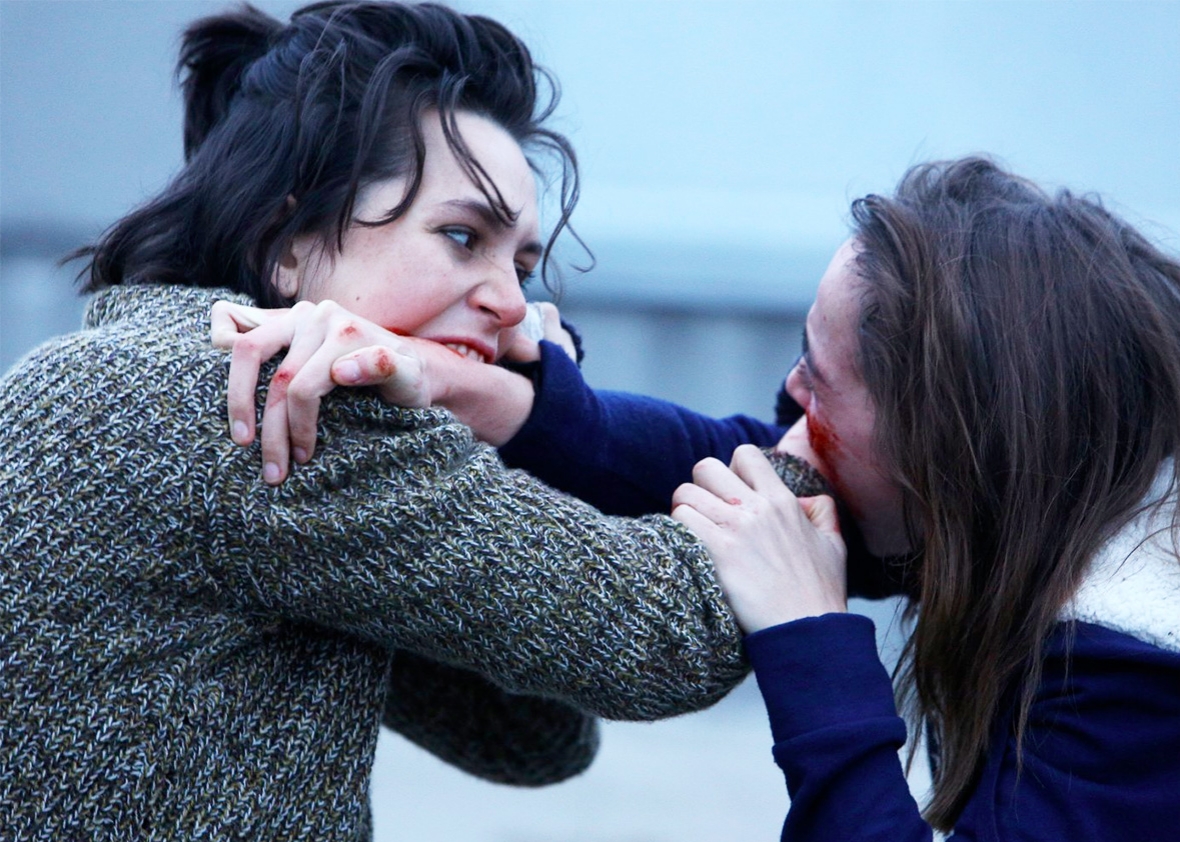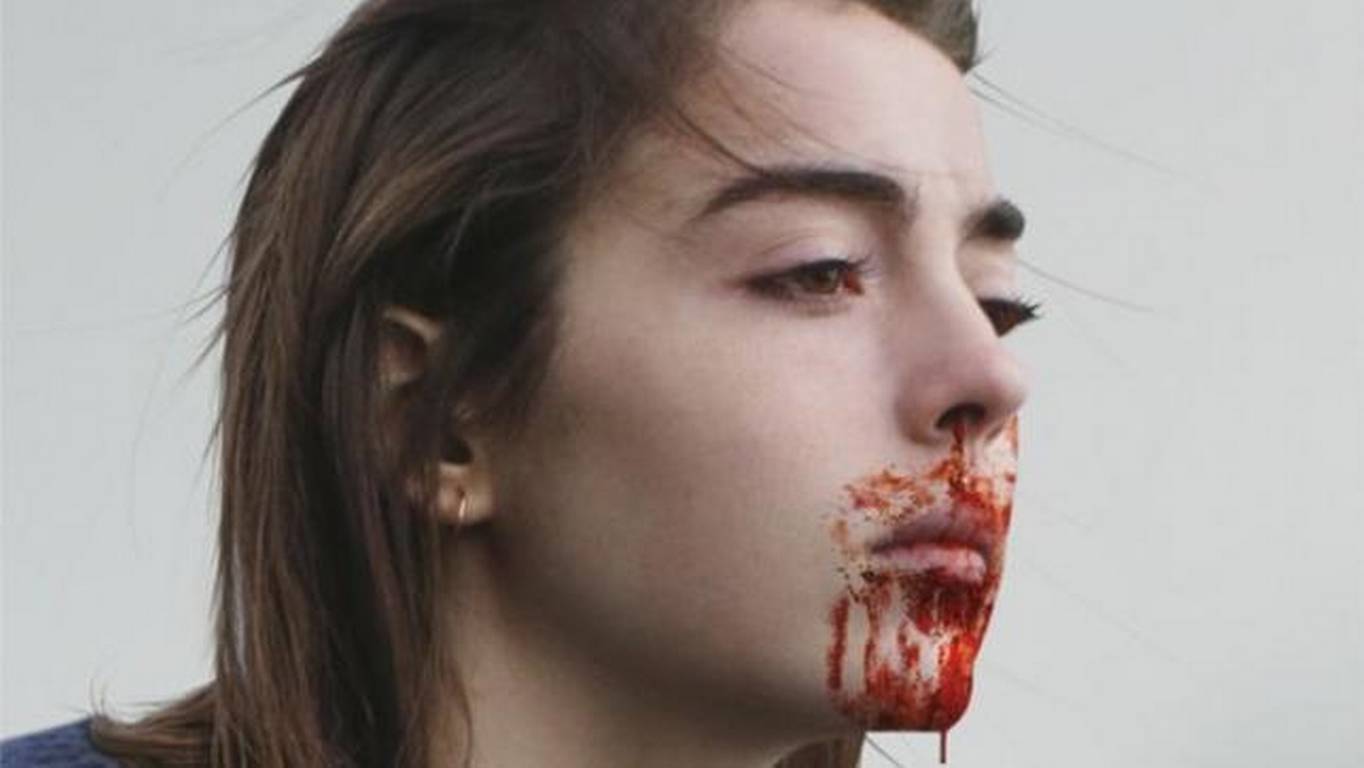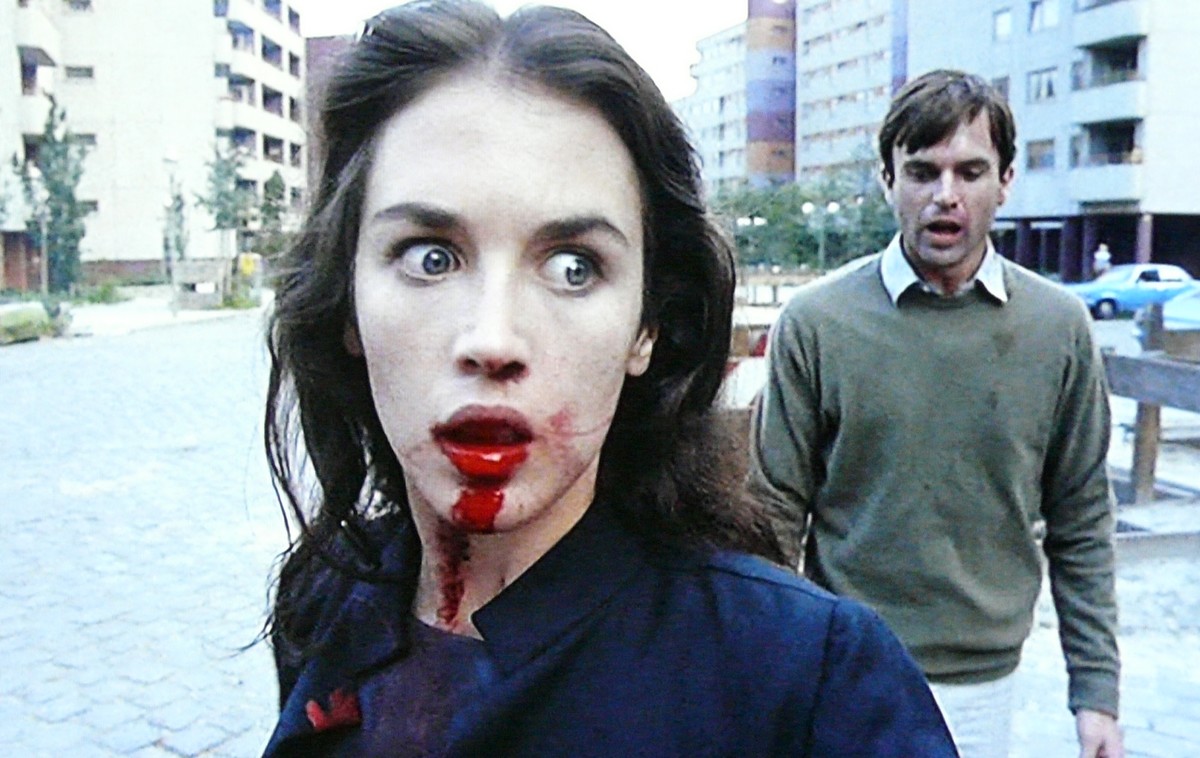Earlier entries in the Vegan Horror series have tended to focus on films with an animal rights subtext (even if their directors occasionally felt compelled to shout out, “It’s about meat”). The whole notion is founded on the idea of mining the signifiers to point out the underlying logic and related concerns. With Julia Ducournau‘s Raw, that would seem to belabor the point.
In Raw — the pulsing, edgy story of virginal vegetarian who, with her first taste of animal flesh, turns cannibal while studying to become a vet — the subtext is simply text.
The French director’s film has a lot on its mind — hierarchies and hazing, power struggles within cliques, sexual repression, body issues, and sisterhood — but the emphasis on animality is never far from the surface (or the screen). Raw is, without question, a body horror consumed by and fixated on the ways we construe the whole idea of the human and the nonhuman. As in Ravenous, Justine’s first taste comes from actual blood, thrown upon her and her classmates in a Carrie-like initiation. Soon, the vegetarian will find herself compelled to eat a rabbit’s kidney, and things will never be the same.
Sounds pretty animal rights related! Don’t ask Ducournau about it, though:
“When I read reactions stating that this is a vegetarian movie, I get very confused … Her being vegetarian is just a storytelling tool. If you’re going to have a character become a cannibal, it’s good to have her be the complete reverse of that at the start of the story. It’s so funny because if I wanted to make a film about vegetarians than I would have made a whole other movie.”
Fair enough, though this once again affirms the old adage that the author is invariably the last person you want to ask about their work. (Not to mention the fact that Ducournau’s earlier genre-melding shorts include Junior, about a bullied tomboy who metamorphosizes into a skin-peeling snake-like creature before emerging as a “real girl”.)

The animalistic transformation of our protagonist Justine (Garance Marillier) in Raw — or at least the transformation animality allows — is no less drastic. Introduced as a shy, college-bound freshman who, while dining with her similarly vegetarian parents, encounters a piece of horrifically unwelcome animal meat in her meal, Raw aligns us with her character from the start. This will prove a fraught identification.
Justine is following in the footsteps of her sister Alexia (Ella Rumpf), and her parents’ footsteps before her, to veterinary school. At least early on, this elision of flesh-consumption, animal-based healing industry, and generational family dynamics straddles the line between playful and a bit silly in its insistence. Of course, perhaps the director is correct and I’m simply reading too much into this relentless drumbeat of signifiers.
Sarcasm aside, Ducournau is absolutely earnest in emphasizing the film’s focus on hierarchy, power, and vulnerability. A nightmarishly hallucinogenic set-piece introduces us to the school, where the “Elders” or “Great Ones” (as they demand to be called) lord it over the incoming class like a particularly sadistic outtake from Dazed & Confused, with more molly and French dance music.
For our purposes here, Raw introduces from the start several sets of removes: parental control; a struggle for identity between older and younger sisters; an institutionalized divide between the seniors and the freshmen, and between the instructors and the students; the more fundamental divide between the doctors-in-training and their specimens, alive or dead; and, of course, that ubiquitous blood and flesh that will ultimately awaken something frightening in Justine, no matter how much she tries to hide from it. Even concerns about race, class, and queerness find their way in.

Like the early David Cronenberg, who she clearly admires, Ducournau has a knack for pairing high-art unease with splatter-schlock tableaux, giving Raw an entirely uncomfortable sense throughout.
Despite a rather clever, William Castle-like reputation for making audiences pass out in fright upon release, Raw functions on a much more cerebral level, with long takes and anxious formalism more akin to Claire Denis’ Trouble Every Day than some midnight gross-out cheapie. And it’s more effective for just this reason: the narrative proceeds with an inevitability from the opening moments and only picks up resonances, particularly as Justine begins to own the new being she’s becoming. (Another Cronenberg nod: Raw is as sympathetic to the monsters as Shivers or Rabid was to the virus.)
It would be easy, and unfortunate, to map through a basic throughline that reads as anti-vegan all the way: the sheltered girl finds growth and power once she tastes flesh, revealing a fundamental nature that her upbringing had foolishly denied. In this way, Raw could simply be the “where do you get your protein?” of body horror confrontations.
 But there is more going on in the film than that. Ducournau assembles these references and oblique readings on top of a sometimes obvious narrative, and we’re left unclear whether Justine has in fact become something worth becoming. A brief scene mentions bulimia and another anorexia (just as the revenge story Mange did, another of Ducournau’s earlier shorts). Questions of determinism and free will underline much of the final third, along with a murder (or should it be a “kill”?) that causes a great deal of grief. The sisters will find themselves linked by blood in the most literal sense, just as the vet students will be immersed in viscera as part of their studies.
But there is more going on in the film than that. Ducournau assembles these references and oblique readings on top of a sometimes obvious narrative, and we’re left unclear whether Justine has in fact become something worth becoming. A brief scene mentions bulimia and another anorexia (just as the revenge story Mange did, another of Ducournau’s earlier shorts). Questions of determinism and free will underline much of the final third, along with a murder (or should it be a “kill”?) that causes a great deal of grief. The sisters will find themselves linked by blood in the most literal sense, just as the vet students will be immersed in viscera as part of their studies.
It is better to take Ducournau at her word, then, while also allowing for the numerous interpretations Raw allows. The conception of vegan horror here, she will no doubt be relieved to hear, isn’t to find a key to unlock art. It’s simply to examine how these echoes manifest, and in what ways.
In Raw, they spider out like fault lines. Is this a “vegan film”? Sure, and of course not. Is Andrzej Zulawski‘s Possession about divorce? Appropriately enough, Ducournau invokes that meaning-rich film overtly:


Despite its thematic fixations, and like Texas Chainsaw and its progeny, Raw excels at spurring on thought through the logic of its images and the internal coherence of its narrative. The rest is up to the viewer.

